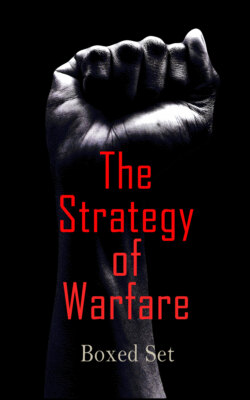Читать книгу The Strategy of Warfare – Boxed Set - Carl von Clausewitz - Страница 178
На сайте Литреса книга снята с продажи.
CHAPTER XII. AGREEMENT FOR UNDERTAKING A WORK.
ОглавлениеTable of Contents
WHEN an agreement is made on the condition "Let us have a fort built," it is termed agreement for undertaking a work.
Whoever of the two kings builds an impregnable fortress on a spot naturally best fitted for the purpose with less labour and expenditure overreaches the other.
Of forts such as a fort on a plain, in the centre of a river, and on a mountain, that which is mentioned later is of more advantage than the one previously mentioned; of irrigational works (setu-bandha), that which is of perennial water is better than that which is fed wit water drawn from other sources; and of works containing perennial water, that which can irrigate an extensive area is better.
Of timber forests, whoever plants a forest which produces valuable articles, which expands into wild tracts, and which possesses a river on its border overreaches the other, for a forest containing a river is self-dependent and can afford shelter in calamities.
Of game-forests, whoever plants a forest full of cruel beasts, close to an enemy's forest containing wild animals, causing therefore much harm to the enemy, and extending into an elephant-forest at the country's border, overreaches the other.
My teacher says that of the two countries, one with a large number of effete persons, and another with a small number of brave persons, the latter is better inasmuch as, a few brave persons can destroy a large mass of effete persons whose slaughter brings about the destruction of the entire army of their master.
Not so, says Kautilya, a large number of effete persons is better, inasmuch as they can be employed to do other kinds of works in the camp: to serve the soldiers fighting in battlefields, and to terrify the enemy by its number. It is also possible to infuse spirit and enthusiasm in the timid by means of discipline and training.
Of mines, whoever exploits with less labour and expenditure a mine of valuable output and of easy communication overreaches the other.
Which is better of the two, a small mine of valuable yield, or a big mine productive of commodities of inferior value?
My teacher says that the former is better inasmuch as valuable products, such as diamonds, precious stones, pearls, corals, gold and silver, can swallow vast quantities of inferior commodities.
Not so, says Kautilya, for there is the possibility of purchasing valuable commodities by a mass of accumulated articles of inferior value, collected from a vast and longstanding mine of inferior commodities.
This explains the selection of trade-routes:
My teacher says that of the two trade-routes, one by water and another by land, the former is better, inasmuch as it is less expensive, but productive of large profit.
Not so, says Kautilya, for water route is liable to obstruction, not permanent, a source of imminent dangers, and incapable of defence, whereas a land-route is of reverse nature.
Of water-routes, one along the shore and another in mid-ocean, the route along, and close to the shore is better, as it touches at many trading port-towns; likewise river navigation is better, as it is uninterrupted and is of avoidable or endurable dangers.
My teacher says that of land-routes, that which leads to the Himalayas is better than that which leads to the south.
Not so, says Kautilya, for with the exception of blankets, skins, and horses, other articles of merchandise such as, conch-shells, diamonds, precious stones, pearls and gold are available in plenty in the south.
Of routes leading to the south, either that trade-route which traverses a large number of mines which is frequented by people, and which is less expensive or troublesome, or that route by taking which plenty of merchandise of various kinds can be obtained is better.
This explains the selection of trade-routes leading either to the east or to the west.
Of a cart-track and a foot-path, a cart-track is better as it affords facilities for preparations on a large scale.
Routes that can be traversed by asses or camels, irrespective of countries and seasons are also good.
This explains the selection of trade-routes traversed by men alone (amsa-patha, shoulder-path, i.e., a path traversed by men carrying merchandise on their shoulders).
It is a loss for the conqueror to undertake that kind of work which is productive of benefits to the enemy, while a work of reverse nature is a gain. When the benefits are equal, the conqueror has to consider that his condition is stagnant.
Likewise it is a loss to undertake a work of less out-put and of a greater outlay, while a work of reverse nature is a gain. If the out-put and outlay of a work are at par, the conqueror has to consider that his condition is stagnant.
Hence the conqueror should find out such fort-building and other works as, instead of being expensive, are productive of greater profit and power. Such is the nature of agreements for undertaking works.
[Thus ends Chapter XII, "Agreement for Undertaking a Work," in the section of "Agreement for the Acquisition of a Friend, Gold, or Land and Agreement for Undertaking a Work"' in Book VIII, "The End of the Six-fold Policy” of the Arthasástra of Kautilya. End of the hundred and tenth chapter from the beginning.]
